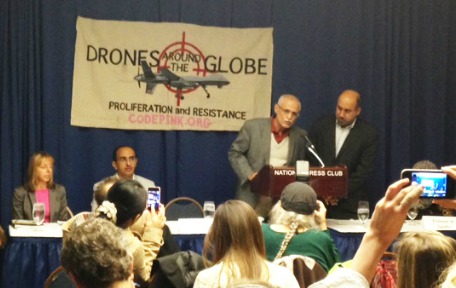
"I came here to share with you my story and what happened to my family. Who are the ones responsible for the deaths of my relatives? Will anyone be held accountable for their deaths?” A day after his son’s wedding, Faisal bin Ali Jaber, a Yemeni civil engineer, mourned the death of his brother-in-law, Salem bin Ali Jaber, an outspoken anti-extremist cleric, and his nephew, Waleed, a policeman, when they were killed without warning by a US drone strike on August 29, 2012.
Jaber testified at a Congressional briefing on November 19, 2013, hosted by Representatives Barbara Lee, Alan Grayson, and Jan Schakowsky. These hearings give Congress an opportunity to listen to those people who have been directly impacted by US drone strikes in Yemen- the human cost of this war.
As he was speaking another drone attacked his home province of Hadramawt, killing three.
Only five Congressman attended the hearing. They came seeking information as the drone program is classified. “It’s conducted by the CIA, which generally doesn’t acknowledge existence of this program,” said Rep. Grayson about the secrecy. “It’s like a strange and extreme police action. There’s a reluctance on the part of the administration to acknowledge that attacks are happening at all.”
According to Wired.com, the U.S. has two separate drone campaigns underway in Yemen — one run by the CIA, the other by the military’s Joint Special Operations Command. Together, they’ve conducted 43 strikes in two years, according to a Long War Journal tally, killing 274 people. Exactly how many of the 274 were militants is tough to tell; the U.S. “counts all military-age males in a strike zone as combatants,” the New York Times recently reported. If someone acts like a terrorist— which is undefined— he could be taken out in a so-called “signature” strike. Only reliable way to know is by hearing direct testimony from the families affected.
Joined by Medea Benjamin of CODEPINK and Robert Naiman, Policy Director of Just Foreign Policy, explained why making the drone strike transparency provisions of the Senate intelligence authorization into law, would be a significant step forward in Congressional oversight of the policy. Naiman suggested that the House Intelligence Committee should introduce legislation to force the Obama administration to disclose civilian casualties from drone attacks and that Congress explore establishing a compensation fund.
Last May, Rep. Barbara Lee introduced the Drones Accountability Act (HR 2183) to place a moratorium on the use of drones “until all legal mechanism are in place” and to repeal the 2001 AUMF (Authorization of Military Force).
The briefing followed the Global Drone Summit that brought together people from around the world to discuss strategies to stop the proliferation of drones used for killing and spying. The conference was organized by the peace group CODEPINK, along with the Institute for Policy Studies, The Nation Magazine, Center for Constitutional Rights, and National Lawyers Guild (Georgetown Chapter).
The delegation had gripping stories to tell about how drones have affected their families, their communities and their efforts to bring democracy to to the tough terrains of Yemen. Entesar al Qadhi is a female Yemeni politician from Mareb, a prominent location for US drone strikes. She is “a leading voice in the revolution that overthrew dictator Ali Abdullah Saleh.”
“What can possibly justify terrorizing a community of 250,000 just for the purpose of killing one person? It might be the right of the U.S. to protect itself, but that doesn’t mean it can terrorize entire communities,” she conveyed the message of thousands of Yemenis to Americans. Two members of Al Qaeda were in al Qadhi’s village, one of the most oil rich areas of Yemen, as villagers were negotiating with the two men. “A drone killed the chief negotiator, scuttling [deliberating sinking] negotiations,” according to drone critic, Professor of Law Marjorie Cohn, as they did recently in Pakistan.
The people of the area now feel that the “drones are for Al Qaeda, not against Al Qaeda,” said Al-Qadhi at the Global Drone Summit. She had a friendly warning for Americans that Yemenis may be the lab rats, as they were a poor, voice-less nation but this technology would eventually land on American shores.
The third member of the delegations was Baraa Shiban, project co-ordinator for the legal group Reprieve. He has researched civilian victims of US air strikes and is a drone critic. He and Al Qadhi serve as youth representatives in Yemen's National Dialogue. He was detained at London’s Gatwick Airport in September under schedule 7 of the Terrorism Act. Cory Crider, who heads Reprieve's Abuses in Counter-Terrorism team said of the incident: "if there were any doubt the UK was abusing its counter-terrorism powers to silence critics, this ends it."
Shiban was never a terror suspect. Glenn Greenwald, an esteemed journalist writes that top secret US government documents leaked by NSA whistleblower Edward Snowden “characterize even the most basic political and legal opposition to drone attacks as part of "propaganda campaigns" from America's "adversaries".”
Jaber had requested a meeting with President Obama.









Comments powered by CComment